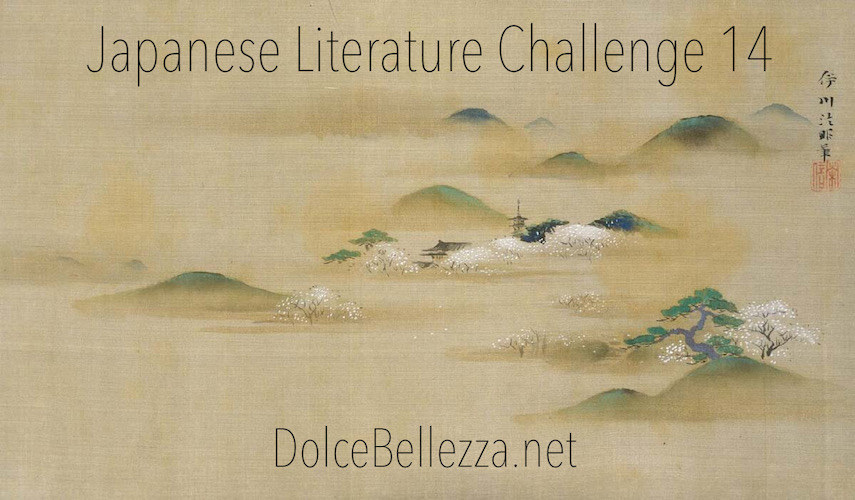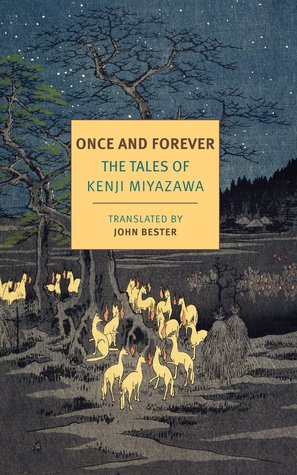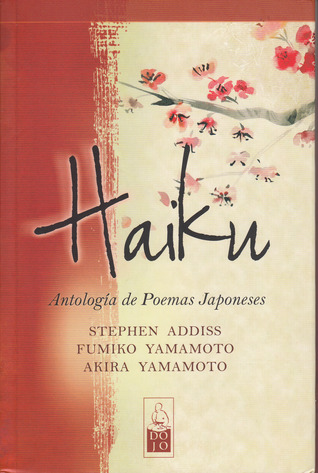
This is the final month for the Japanese Literature Reading Challenge, so I really had to hurry up with this one. I had two main recommendations for this month: Once and Forever: The Tales of Kenji Miyazawa, and an anthology of Japanese Haiku poetry compiled by Yamamoto and Addiss. And although not “literature”, also the superbly mind-bending scifi anime, Paprika.

Once and Forever / Japanese Folklore Anthologies
I’m not sure how I came across Once and Forever, but this was so rich and moving and unlike any other folklore anthology I’ve ever come across. We tend to think of folklore as simple tales from long ago, with some moral message and practical wisdom. But Miyazawa’s folktale collection goes deeper. There’s dry humor and hope here, when he speaks of human frailties and oddities. Miyazawa contrasts the human world with the natural world, and there’s darkness there too. My favorites are and . But I wish I could persuade everyone to read this thought-provoking and hair-raising (in a good way!) anthology.
Along the same lines is the Once Upon a Time in Japan by Roger Pulvers & Juliet Carpenter, and they have a public domain audiobook version HERE. The tales in here are more of the simple, charming variety, but he illustrations were quite charming (). Fairytale News also has a wonderful post showcasing Japanese folklore illustrations, so hope you check out that post too!



Haiku

I’d heard of Haiku, but never read it before. It’s a complex Japanese word, and when translated, seems to roughly mean poems of 5-7-5 syllables about the seasons. But over time Haiku (originally, ) has evolved; now, it describes not just the seasons, but also the natural world and the passage of time, especially when viewed from the human lens. The human lens adds a strange melancholic beauty to the verses, like something that becomes precious because it can never be recaptured.
After a few trials-and-errors, I came across Yamamoto’s Haiku: An Anthology of Japanese Poems, which was perfect. It collects Haiku from many famous poets, and the ones from Basho and Issa were my favorites. Best taken in small doses, and savored.
On the wisdom in waiting:
“Sitting silently, doing nothing
spring comes
and the grass grows — by itself.”
On the imagery of the natural world:
“The warbler
wipes its muddy feet
on plum blossoms.”
And this last one, which made me laugh:
“Heaven knows,
earth knows, every neighbor knows—
parents don’t know.”
Paprika
Paprika is about a groundbreaking device that a scientist has invented to help psychiatrists enter the dreams of their patients, detect and understand their problems (as manifested in the dreams of the patients) and fix them. Lately, however, someone has stolen that device and is causing mayhem by entering the dreams of the psychiatrists themselves. Paprika is a strangely hypnotic, mystifying and very well directed (by Satoshi Kon) anime show. I went into it looking to be puzzled by a convoluted story, and I was. I was also charmed beyond my expectations. It needs a second watch though, before you finally can make sense of the entire picture, but it’s worth the effort.
8 replies on “More Japanese Recs: Folklore, Haiku & Anime”
Love the wisdom of waiting. Very true! Once and Forever really seems like a great read. I’m sorry I’ve missed the Japanese Literature Challenge, maybe next time I’ll catch it.
Elza Reads
It’s hosted every year – and “January in Japan” is another challenge that starts off the year. You can start shortlisting books in the meantime 🙂
That last haiku – so funny. Thank you for the recommendations! I’ve already read one book but just need to review it.
Haha, yeah that Haiku reminded me of so many childhood / adolescence problems. 😀 And look forward to your post too!
Once and Forever looks wonderful, I’m really interested in that now. I like how there’s humor as well.
Paprika certainly looks interesting, kind of genre- bending perhaps?
Well-spotted on the Paprika genre-bending. Fantasy + (Dystopian) Scifi + Horror, all three into one. And I really hope you try out Once and Forever, I feel it’s one of the hidden gems.
So glad you delved in the world of haiku. 2013 was my own big haiku year.
I highly recommend The Essential Haiku: Versions of Basho, Buson, and Issa, edited by and with introduction by Robert Hass
Published in 1994. Excellent introductions. I talked a bit about it here: https://wordsandpeace.com/2020/02/23/sunday-post-26-2-23-2020/
Buson – I don’t think Yamamoto had haiku by Buson. Thanks for sharing the link, will definitely check it out!